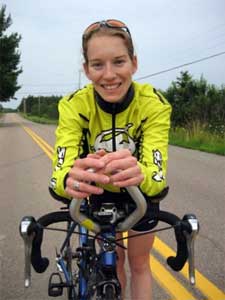 |
| Meagan Timney balancesВ graduate studies withВ physical activity. "I've got a low boredom threshold," she laughs.В |
Meagan Timney canГ•t wait to get at it. She wants to rediscover the poetry of working-class women Г‘ factory workers and seamstresses of a political bent Г‘ buried somewhere on the shelves and stacks at the British Library.
A three-month research trip to England is in the works.
ItГ•s all possible because of a $40,000 doctoral fellowship awarded by the Social Sciences and Humanities Research Council of Canada (SSHRC).
SSHRC has announced $119.7 million in grants, scholarships and fellowships for CanadianВ post-docs, PhDs and masterГ•s students in the social sciences and humanities. The lionГ•s share of the money, more than $100 million, goes to graduate scholarships and fellowships Г‘ concrete support for nearly 2,400 of CanadaГ•s most promising researchers.
Researchers like Ms. Timney, a PhD student in English lit, who came to »ЖЙ«ЦұІҘ to work with Dr. Marjorie Stone. The 25-year-old from Ilderton, Ont. will be focusing on the reclamation of poetic texts that have received little, if any, critical attention.
Other »ЖЙ«ЦұІҘ researchers awarded fellowships include: Catherine Cottreau-Robins for her research on the landscape of slavery in post-evolutionary Nova Scotia; Robert Harding for a social history of the political culture in Newfoundland and Labrador, 1949-72; and Marcus Juodis for the thought-processes of fugitives who evade arrest for more than 30 days. In total, 35 »ЖЙ«ЦұІҘ students and post-docs received more than $1.5 million in SSHRC funding.
While the poets were popular in their day, when poetry and ballads were in vogue, many of them have receded to obscurity. Ms. Timney is looking forward to bringing them into the light once more.
Г’A lot of these poets have never been read (since the Victorian era),вҖқ she says. Г’IГ•m hoping to make some discoveries.вҖқ
As well as being a doctoral student, Ms. Timney is a tri-athlete, who maintains a rigorous training schedule in addition to her studies. She trains an average of 15 to 20 hours per week.
She says the dedication and determination required for graduate studies is identical to those needed to train and compete at a high level of sport.
Г’I actually find it easier to do both,вҖқ she says. Г’If my brain needs a rest, then I can go work my body. When IГ•m stuck, itГ•s great to go for a run or a ride. Everything seems to make sense again when IГ•m back at it.вҖқ
